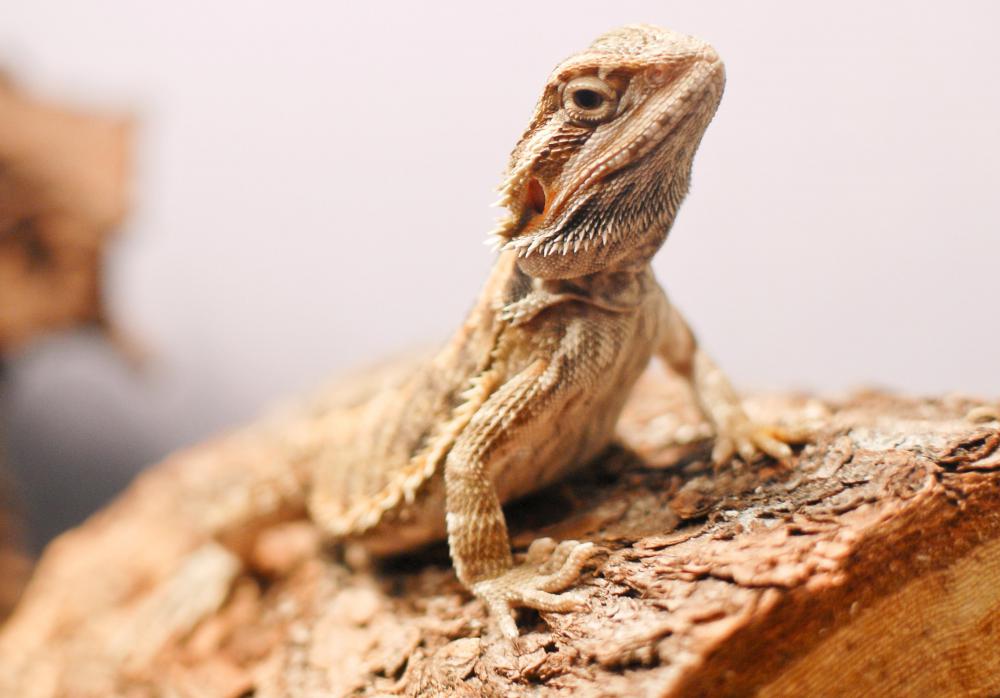At AllThingsNature, we're committed to delivering accurate, trustworthy information. Our expert-authored content is rigorously fact-checked and sourced from credible authorities. Discover how we uphold the highest standards in providing you with reliable knowledge.
How Do I Recognize Brumation in Bearded Dragons?
Brumation in bearded dragons can vary considerably among individuals. An otherwise healthy bearded dragon, over one year old, will usually display common behaviors indicating the approach of its dormant period. An individual will become increasingly lethargic and spend more time sleeping. The bearded dragon will usually cease basking in warm areas, and retreat to cooler areas of its habitat. Feeding will slow, or even halt, but without a significant loss in weight.
This behavior is often mistaken for illness instead of brumation in bearded dragons. If an individual is less than a year old, the behavior may be suspect as bearded dragons do not normally begin brumation until later in life. Lethargy and loss of appetite accompanied by a noticeable weight loss can be symptoms of an illness. If bowel movements change consistency or have an unpleasant odor, a parasite infection might be to blame. A trip to the vet for a fecal exam might be in order.

Not all bearded dragons brumate, though the large majority of them do. There is considerable variety in behavior among individuals in the brumation of bearded dragons, both in the period proceeding it and during the dormant period itself. In the wild, brumation is a response to changing environmental conditions. A domesticated bearded dragon may become dormant even though it is kept in constant conditions year-round. Multiple dragons housed in the same habitat, under the same conditions, are likely to have individually unique timing in brumation.

Owners sometimes try to facilitate brumation in bearded dragons. When a dragon's behavior indicates that a dormant period is approaching, the owner may gradually lessen its exposure to light and reduce the temperature of the habitat. The pet is bathed, both to assure proper hydration and encourage a pre-dormancy bowel movement. Entering into brumation on a full stomach leads to infection. The general consensus, however, seems to be that the bearded dragon is best left to itself for the process.
Concern is sometimes expressed among owners about the duration of brumation in bearded dragons and how to recognize any complications. A dragon might enter a deep sleep and not stir for a period of weeks if not months. Another might take naps ranging from hours to days during the dormant period and otherwise be awake though less alert than usual. Some dragons will not enter a deep sleep but will refuse food for long periods. As long as it is well hydrated and free of parasites, the bearded dragon will pass through this phase healthy and with ease.
Frequently Asked Questions
What is brumation in bearded dragons?
Brumation is a period of dormancy in reptiles, similar to hibernation in mammals. In bearded dragons, it's a natural part of their lifecycle, typically occurring in the cooler months when their metabolism slows down. During this time, they conserve energy by reducing physical activity, appetite, and overall metabolic rate.
How can I tell if my bearded dragon is entering brumation?
You may notice your bearded dragon becoming less active, showing less interest in food, and spending more time in a cool, secluded part of their enclosure. They may also sleep more often and have a decreased basking time. These behavioral changes are key indicators that your pet may be preparing for brumation.
Is it normal for bearded dragons to eat less during brumation?
Yes, it's completely normal for bearded dragons to eat less or even stop eating altogether during brumation. Their metabolism slows down significantly, reducing their need for food. However, they should still have access to fresh water and a healthy environment to ensure they stay hydrated and safe during this period.
How long does brumation last in bearded dragons?
Brumation in bearded dragons can last anywhere from a few weeks to several months, depending on the individual dragon and environmental factors. It's important to monitor your pet for any signs of distress during this time and consult a veterinarian if you have concerns about their health or the duration of brumation.
Should I wake my bearded dragon up from brumation for feeding or bathing?
It's generally not recommended to wake a bearded dragon from brumation for feeding, as their digestive system is not active enough to properly process food. However, occasional gentle baths can help with hydration and cleanliness, provided you allow them to return to brumation without stress.
Can brumation be harmful to my bearded dragon's health?
Brumation is a natural and typically safe process for healthy bearded dragons. However, if a dragon enters brumation with undigested food in its stomach or is in poor health, it can lead to complications. Always consult with a veterinarian experienced with reptiles if you're unsure about your pet's condition before or during brumation.
AS FEATURED ON:
AS FEATURED ON:












Discuss this Article
Post your comments